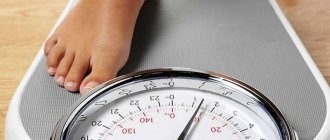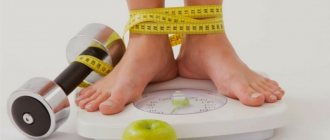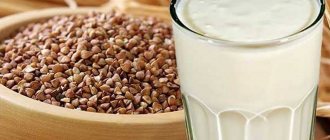How much weight can you lose in a week and is it really possible to burn maximum fat reserves in such a short period of time? Some strive for the coveted figure of 5 kg, and for some this is not enough - they want more and go on express diets, deny themselves food in order to fit into new jeans or look good for their birthday. Are these ways to get your figure in order justified?
Since any restrictions that lead to a lack of valuable substances in the body have nothing to do with proper nutrition, we do not recommend going to great lengths and depriving yourself of energy replenishment. Radical measures cannot lead to a stable result - only to sad consequences for your health and the functioning of the whole body.
Our additional services: Bioimpedance | Marutaka Massage | Pressotherapy | Ion-Detox
How many kg can you lose in a week: looking for the right method
Enterprising businessmen who are ready to make money on your figure promise everything - minus 5, 10, even 15 kg in seven days. Is there any truth to these assurances? Depends on what you want to get rid of. From fat? Then see how express methods actually work.
Let's start with the fact that getting rid of excess weight and reserves that went into the fat layer that has been accumulating in our body for years is not quite the same thing. Under the guise of a heavy load of two or three kilograms, water or waste may come out. You can “lose weight” by drinking a laxative or diuretic, but this does not apply to our goal, because everything that should be burned will remain in place.
The only way to say goodbye to hated fat once and for all is to burn it in your own body, creating an energy deficit. Then all this building material will be removed from our hips, legs and waist - so that we can live a full active life. To do this, you need to change your attitude towards rest and physical activity (move more) and your diet - exclude from it foods that become “building blocks” for new kilograms, add more healthy food, and do not overeat.
Please note that we never said that you need to have fasting days or completely give up food. Why? In order to answer this question, let’s figure out what the impact of such radical measures on the figure is.
- Those who write about how many kg you can lose in a week by fasting are unlikely to talk about the features of such a “universal” method with unpredictable consequences. The first thing a person does when he decides to cut off the supply of nutrients to the body is to limit daily caloric intake. And very much - up to 500-600 kcal, which leads to exhaustion.
- What happens when we deprive ourselves of food? Energy for life needs to be taken from somewhere - in this case, from carbohydrate reserves. They are stored as glycogen bound to water. So when you lose weight, it is this that goes away, and the fat remains in the “bins”.
Now imagine the following: at first we ate a lot and heartily, and then we came to our senses and decided to lose weight - for example, for a holiday or summer vacation. You need to get rid of 5-7 kg - urgently and with a guarantee that nothing will come back. We refuse food or give our body “unloading” - we practically don’t eat.
However, we still have those remnants that have not had time to be digested. Different foods are absorbed differently, so there is no need to say that the inside is empty and energy consumption due to fat has begun. Only with normal nutrition - several times a day - are some “leftovers” gradually replaced by others, and with restrictions and fasting they become less and less - until they disappear completely.
What happens?
- First, we lose weight - that is, we lose water, as mentioned above. At first - 1-2 kg per couple of days.
- Since this loss is a one-time loss, after a week or five days (depending on how long the chosen method is designed for), the weight stops decreasing.
Conclusion: stable results can only be achieved with proper nutrition – regular and balanced. Everything else is a short-term decrease in body weight due to loss of water, not fat. How to lose maximum weight in a week? Switch to a healthy diet and start small. Don’t chase a number that is unattainable – set yourself only achievable goals. You won’t be able to jump over your head, but it’s quite possible to develop health problems.
How much weight can you really lose in a month?
Losing excess weight in a month is a very real task.
The main thing is not to place high hopes on extreme diets and not to subject the body to stress in the form of starvation and excessive physical activity.
It is important to know! An acceptable rate of weight loss is no more than 0.8-1 kg per week. By following the right diet and playing sports, you can safely get rid of 5 kg in 4 weeks for your body.
table of optimal weight and height for women and men
How much can you lose without exercise and on proper nutrition in a month?
Limiting your calorie intake and eliminating certain foods from your diet will help you get rid of fat deposits and improve the condition of your skin and overall appearance.
Without sports activities, the path to the desired goal will not be as fast as we would like , but still, following a healthy diet and changing eating habits will be beneficial and your figure will gradually change for the better.
Without sports activities, the path to the desired goal will not be as fast as we would like.
The transition to proper nutrition requires compliance with a number of rules:
- Avoid fatty foods and limit your consumption of fried foods. They fill you up quickly, but contain a large amount of calories.
- Avoid sweet bars and treats containing a lot of sugar. They can be replaced with dark chocolate, dried fruits, fruits and berries that contain many vitamins (apples, bananas, strawberries, etc.).
- Be sure to get into the habit of eating breakfast. During breakfast, metabolic processes in the body are launched, which help speed up metabolism. A breakfast rich in proteins, fats and carbohydrates will give you an energy boost for the whole day.
- Drink at least 2 liters of clean water per day. Water will speed up your metabolism and also help eliminate waste and toxins. Limit coffee consumption and completely eliminate alcohol, which retains water in the body and poisons the body as a whole.
- There should be several meals during the day. Small portions are digested faster, metabolism is accelerated and fat deposition is prevented.
Proteins, fats and carbohydrates are needed by the body equally; they all participate in the breakdown of fat.
The following foods rich in them are allowed:
- Proteins – dairy products, meat, fish, eggs.
- Fats - oils (olive, flaxseed), nuts, wholemeal bread, fatty fish, meat, seafood.
- Carbohydrates – root vegetables, vegetables, legumes, cereals.
Eating habits are quite easy to change, the main thing is to follow a diet and adhere to your BJU norm.
You won’t be able to quickly lose weight with proper nutrition in a month, but this is the most effective way to get into shape for a long time.
On a vegetarian diet
The basic rule of following a vegetarian diet is the limitation or exclusion of animal fats and proteins from the diet.
Vegetarian nutrition involves a gradual transition to plant foods.
This diet will help start the process of complete renewal of the body and natural fat burning. In a month of competent adherence to nutritional principles, you can lose 8 kg.
The basic rule of following a vegetarian diet is the limitation or exclusion of animal fats and proteins from the diet. They can be replaced with vegetable protein, milk fats, and eggs.
It is also recommended to add vegetable oils to food, such as sesame, coconut, and corn.
Excellent sources of polyunsaturated fats are nuts (cashews, almonds, hazelnuts).
Protein on a vegetarian diet is obtained from cottage cheese, a small amount of chicken eggs (no more than 3 per week).
It is recommended to exclude sugar and salt completely . Dishes can be seasoned with a little lemon juice or natural seasonings. Sugar and sweet treats are replaced with fruits and natural honey.
It is important to remember about water - drink at least 2 liters per day.
Sample menu for the day:
- Breakfast – 1 boiled egg, vegetable salad with beans, seasoned with 1 tbsp. l. lemon juice.
- Lunch – rice with vegetables, bread (50 grams).
- Snack – sweet fruits (200 grams).
- Dinner – cottage cheese, kefir.
Must Read: These 5 Exercises Will Quickly Burn Up to 2,500 Calories in Just 25 Minutes
On a protein diet
A protein diet is based on eating a large amount of protein-rich foods and cutting back on carbohydrates.
It is important to remember about water - drink at least 2 liters per day
In a month of following the diet, you can lose up to 10 kg, which will not return.
The main feature of this diet is that the body, which does not receive enough carbohydrates for a certain time, begins to use up its own fat reserves.
For 4 weeks, a protein diet does not harm the body, but you should not abuse it for longer.
A monotonous diet can cause a slowdown in metabolic processes, deterioration of well-being, and even negatively affect the condition of the kidneys due to the high concentration of protein.
Principles of a protein diet:
- Exclusion from the diet of flour, sweets, and fatty foods. These products include pasta, potatoes, vegetable oil and butter.
- Input of foods such as: low-fat dairy products, vegetables, eggs, lean meat and fish.
- The break between meals is no more than 2 hours. Such a nutritional scheme will put metabolic processes in the body in order.
- Compliance with drinking regime. You should drink as much pure water as possible while following a protein diet. You don’t have to limit the consumption of coffee and tea at any time of the day, but don’t add sugar or milk to drinks.
You can include foods such as:
- lean beef;
- skinless chicken breast;
- seafood;
- lean fish;
- tofu cheese;
- low-fat cottage cheese;
- egg whites.
Products can be combined with each other; soy sauce, lemon juice, and spices can be used to season ready-made dishes. You can also add various vegetables, especially those rich in fiber.
Important! Before switching to a protein diet, you should consult your doctor. It is contraindicated for diseases of the kidneys, heart, and gastrointestinal tract. It is also not recommended for pregnant and breastfeeding women.
Combining proper nutrition and exercise
The combination of physical activity and proper nutrition is the surest way to achieve the ideal.
The combination of physical activity and proper nutrition is the surest way to achieve the ideal.
Changing your eating habits will improve the condition of your skin, hair, and get rid of fat deposits, and sports will help you tighten your figure and develop strength.
All goals must be achieved gradually. It’s better to start with simple but regular workouts that will help you get used to the load. At the same time, it is worth starting to change your diet and give up bad habits.
The calories consumed are burned during activity, and sport is the best activity. Cardio exercises, strength training, and running will help you lose extra pounds and consolidate your success.
If you run every day for 30 minutes
In order to start running, many people need a lot of willpower.
The benefits of such physical activity are obvious:
- You can choose any convenient place - a stadium, a park, an embankment near your home. The route is tailored to each person.
- Regular jogging gets rid of cellulite more effectively than any massage, since the main load falls on the legs.
- The body's endurance increases and breathing improves. Starting with short runs, you can reach the longest ones and get great pleasure from them, feeling how your body becomes stronger and stronger.
- The heart works faster, the blood is actively saturated with oxygen. Metabolic processes throughout the body are accelerated. Immunity increases.
In order to start running, many people need a lot of willpower.
Training rules for losing weight:
- Be sure to warm up your muscles before jogging. To do this, you need to spend a few minutes doing a little warm-up on the spot. This is a mandatory measure aimed at reducing the risk of injury during training.
- The first training sessions should not be long. It is important to listen to your body while running, pause, and restore your breathing.
- In the morning, the process of breaking down fats in the body is more active , so to lose weight it is recommended to go for a run in the morning.
Once the duration of classes has been increased to 30 minutes or more, you can be sure that the fat burning process has started. This is the optimal time for a run aimed specifically at losing weight.
Exercise and weight loss
Sports activities will help you lose weight, and most importantly, get a toned, attractive body.
After 1 month in the gym, changes will become noticeable to others, and the reflection in the mirror will also begin to please.
Without regularity there will be no desired result. An instructor will help you identify problem areas and stress tolerance. He will develop a training program, draw up a nutrition plan and provide the necessary instructions.
The most effective workouts aimed at burning fat are running, swimming, dancing. These are intense loads on all muscle groups.
Be sure to read: Lose 30 kg: how long, how to eat, training program, reviews, menu for the week
Strength training using exercise machines and equipment will help you lose weight and also gain muscle definition.
What if you don't eat after six in the evening?
But dinner is as important a part of the diet as breakfast or lunch.
In the evening, human activity decreases significantly: the energy reserve received in the morning runs out, metabolic processes in the body slow down.
Therefore, there is an opinion that all food eaten in the evening is stored in fat deposits.
But dinner is as important a part of the diet as breakfast or lunch. Each person’s daily routine is individual; often there is a fairly long gap between meals.
Therefore, not eating after 6 pm can be dangerous to your health. Without receiving a supply of energy, the body begins to send “hunger signals” to the brain and provoke painful contractions in the stomach.
The processes of fat breakdown slow down, and excess fat begins to accumulate. Unable to cope with hunger, many resort to late-night snacking and eat much more than they could afford for dinner.
In order not to expose yourself to the risk of eating too much at night, it is worth remembering a simple rule - the last meal should occur at least three hours before bedtime.
For dinner, it is permissible to eat a light vegetable salad, some meat, and dairy products. It is better not to abuse carbonated drinks and juice: all this irritates the stomach and negatively affects your well-being.
No more than 1000 kcal per day
The 1000 calorie diet involves eating any foods whose total energy value does not exceed 1000 kcal.
One of the most extreme diets that helps you lose weight quickly is eating 1000 calories per day.
The 1000 calorie diet involves consuming any foods whose total energy value does not exceed 1000 kcal. Home scales are used for counting.
Sample menu:
- Breakfast: 1 glass of milk 0.5%, 1 boiled egg, grapefruit.
- Lunch: boiled vegetables, green salad, lean meat, tea without sugar.
- Afternoon snack: cottage cheese, milk 0.5%.
- Dinner: vegetables, green salad, lean meat, tea or black coffee.
Important! An extreme diet of 1000 calories will help you lose up to 10 kg in a month, but there is a risk of quickly regaining the lost weight if you do it wrong. This method of losing weight is suitable only in the most exceptional cases, when you need to change by a specific date.
1200 calories per day
The 1200 calorie nutrition system does not harm the body. It is suitable for those who lead a sedentary lifestyle and want to reduce the amount of calories they consume without engaging in physical activity.
The 1200 calorie nutrition system does not harm the body
Proper adherence to the diet involves the complete exclusion of fast food, smoked and fried foods, sugar, flour products, and frozen semi-finished products from the diet.
Authorized products:
- porridge;
- fruits and berries;
- low-fat dairy products;
- lean white meat, fish;
- seafood;
- vegetables.
Diet rules:
- drink enough water;
- comply with BJU standards in the diet;
- Divide meals into three, arranging snacks between them at the first sign of hunger.
Sample menu:
- Breakfast: buckwheat porridge, low-fat cheese.
- Lunch: boiled fish, carrot salad.
- Dinner: steam omelette, freshly squeezed juice.
- Snacks: vegetables, fruits, herbal tea.
What are the consequences of extreme weight loss
- Imagine this situation: before your trip to the south, you for a long time forbade yourself from all the most beloved and delicious things, and became a little slimmer. Then they attacked the forbidden sweets. The result is severe cramps in the abdomen, sick pancreas and liver. All this could have been avoided if there had not been a sharp transition from starvation to gluttony.
- The second problem that awaits all supporters of radical measures is that having lost weight in a short time, we do not get the expected relief, but skin that hangs in folds.
- Severe abdominal pain can occur not only from overeating, but also from a sharp reduction in the amount of healthy fats received (from vegetable oils, avocados, etc.). And this is one of the main conditions of many express diets. The result of such deprivation is the formation of gallstones, accompanied by fever, nausea and pain.
So decide for yourself what is more important to you - quickly get rid of 5-10 kilograms or maintain health.
What affects the rate of fat burning
Some people can easily lose 5 kg in a week, while others have to work for several months to lose 1 kg.
This process depends on the following factors.
- Nutritional features. And we are talking not only about the daily calorie content of food, but also about the features of the diet (whether proteins, unsaturated fats, fiber and other nutrients are present in the menu).
- Physical activity. If a person, due to his profession, is forced to move a lot during the day, then he will lose weight faster than an office worker who spends most of his time in a sitting position. Classes at a fitness club, daily gymnastics, jogging and other activities help fight obesity.
- Features of metabolism. For some people it is accelerated from birth, for others it is slow. With proper nutrition and exercise, your metabolism can be accelerated.
- The percentage of adipose tissue in the body and the time during which the mass was gained. A person with 20-30 extra pounds loses weight faster than someone whose weight exceeds the norm by 2-3 kg.
How many kg can you lose in a week: without salt and fat
Another piece of advice you can find online is to completely eliminate salt from your diet. What's the catch? After all, this is white death, and its excess has never made anyone slimmer or happier. We agree, but here’s the other side of the coin - what we usually generously add to salads, soups, and main courses contributes to water retention in the body. As soon as we stop doing this, all the liquid goes away. And this is about 0.3 -0.5 kg of our weight. We repeat: these losses again have nothing to do with getting rid of fat.
It turns out that all attempts to find out how many kilograms you can lose in a week and how to lose as much weight as possible during this time are doomed to failure, because there is no ideal option and the weight will come off extremely slowly? The fact of the matter is that it is stupid to expect incredible results during this time. After all, in the first seven days the body gets rid of only excess fluid. In order for the effect to be stable, we need to switch to proper nutrition and monitor our caloric intake - otherwise we will only gain weight.
So what about salt: should you eat it or not? We recommend reducing its consumption, but not getting rid of it completely.
So, let's summarize. About 1000 g can be lost due to the glycogen associated with water that has left the body, another 2,000 are waste products, approximately 0.5 kg will disappear if we stop adding salt to the dishes on the table. Total: about 4 kg. Again, this is not fat.
Diet options that allow you to lose weight in 1 day
If you are still serious about losing at least some weight within one day, you can resort to this diet adjustment. You will need to eat or drink every 2 hours, that is, aim for eight meals and drink water between them.
| Time | What is allowed to eat and drink |
| at 7 am | drink green tea without sugar; |
| at 9 o'clock | soft-boil 1 egg; |
| at 11:00 | steam 1 tablespoon of raisins; |
| lunch at 13:00 | you can eat 100 g of boiled chicken fillet; |
| at 15 o'clock | drink 1 glass of tomato juice; |
| at 17 o'clock | soft-boiled egg again; |
| at 19 o'clock | have dinner with an apple or banana; |
| before bed, at 21 o'clock | It’s good to drink half a glass (100 g) of low-fat kefir. |
In no case should you skip meals or replace some foods with others. It is important that you need to eat strictly according to the clock. In the intervals before meals (i.e. at 8, 10, 12, 14, 16, 18 and 20 hours) with this diet you need to drink one glass of pure still water. And one more thing: nothing should be salted - this is a mandatory rule, since salt retains water in the body. This way you can lose 1 kg in one day.
Another common option for a one-day strict diet is a fasting day on a mono-diet, that is, on any one type of product. Everyone has heard about kefir, buckwheat and rice days. At the same time, porridge without salt and oil acts as a brush that cleanses the body, which is very useful. Although rice is not the best option due to its strengthening properties, and it will not help everyone lose weight, oatmeal is better in this regard. But a completely kefir day is not suitable for people with high stomach acidity. In any case, before starting a strict (even one-day) diet, you should be aware of the characteristics of your body and understand what will benefit you and lose extra pounds, and what, on the contrary, will only harm you.
The day you choose to lose weight can be spent eating not one, but two foods, and also in small quantities. There are options here too. This can be boiled fish (300 g) and green tea in unlimited quantities. Or boiled chicken breast (200 g) and kefir (0.5 l). Or apples of non-acidic varieties (1 kg) and the same green tea. So, without fasting and physical exercise, you can lose from 0.5 to 1 kilogram of weight per day. But it is not recommended to keep such a diet for more than one day.
It is advisable that the day you plan to lose weight should be a day off, you are not in a hurry and can devote time only to yourself. Although for some it is easier to immerse themselves in work and thus fight the feeling of hunger.
How many kilograms can you lose in a week: a little about energy costs
Here's another example: we decided to lose weight, starved ourselves and created a 100% energy deficit. As a result, our body finds itself in a trap - there is no longer any supply from outside, but we need to spend energy. But where to get them from?
Let's figure out what our energy costs consist of:
- For metabolism
That is, to maintain life in a calm state, without active actions. For example, when we relax, lying on the couch.
- To digest food
Everything that enters our stomach during the day must be digested and absorbed. And this also requires strength - the body takes it from the calories it receives daily.
- For physical activity
This includes not only working out in the gym, but also walking, house cleaning - any movement.
Let's imagine that the maximum weight loss per week when losing weight is all the fat that our body will burn in conditions of energy deficiency. Costs depend not only on whether we have eaten or not, but also on gender, age, and the initial number on the scale.
For example, a woman weighing about 60 kg who wants to lose 5 kg in a week will lose 172 g per day, and up to 1 kg per week if she completely refuses food. In this case, the losses will be “half and half” - 50% muscle, and 50% fat.
Why is this happening? The body, by hook or by crook, tries to preserve what it has accumulated and hidden in bins, and gets rid of what requires the most energy - because there is no replenishment. That is why he begins to waste muscle mass to ensure the normal functioning of internal organs - heart, lungs, brain, etc.
The answer to the question of how many kilograms you can lose in a week by fasting is not so much. You will lose most of your muscle layer, and this is fraught with premature aging of the body and a decrease in metabolic rate. Yes, in total we can get rid of 5 kg in a week - but it will be water with a small proportion of fat. Obese people have a lot of fluid in their bodies, and they can lose more - for example, about 7 kg, by limiting themselves. But the effect of fasting is not worth depriving yourself of food - it cannot be stable, and constant refusals are not good for us.
Don’t forget that after every strict restriction there comes a breakdown – a period of “I’m tired of everything, I want to eat”, which throws you back to the initial indicators. So, mentally prepare yourself in advance for the fact that you won’t be able to lose as much weight as possible in a week. And gradually losing weight by adhering to proper nutrition and counting the calorie content of each serving is easy and simple.
How to safely lose weight
Excess weight appears due to an imbalance in energy intake from food and energy expenditure associated with physical activity.
In order to effectively lose weight in a month, you need to follow the principles of proper nutrition and choose the optimal mode of physical activity.
Proper nutrition
The amount of calories in food to maintain the initial weight at its normal level can be calculated using the WHO formula, which is presented in table form:
| Age periods | Men | Women |
| 18-30 years old | (0.0630*weight in kg+2.8927)*240 | (0.0621* weight in g+2.0357)*240 |
| 31-60 years | (0.0484*weight in kg + 3.6534)*240 | (0.0342*weight in kg + 3.5377)*240 |
| over 60 years old | (0.0491*weight in kg + 2.4587)*240 | (0.0377* weight in kg + 2.7546 )*240 |
The resulting figure is suitable for people with low physical activity. With average intensity of physical activity, the calculated values should be multiplied by a factor of 1.3, and with high loads - by 1.5. To lose weight without harm to health, the resulting value must be reduced by 20%, that is, multiplied by 0.8.
If a person suffered from overeating (absorbed more than 3000 kcal per day), then the reduction in caloric intake should occur gradually (by 300-500 kcal per week). This will significantly reduce the risk of “relapse”.
It is not recommended to reduce daily caloric intake to less than 1200 kcal for women and 1500 kcal for men.
Nutrition must balance the content of proteins, fats and carbohydrates. The optimal ratio for reducing fat mass and preserving muscle is:
- proteins - 45%;
- fats - 15%;
- carbohydrates - 40%.
Doctors do not recommend sticking to one-ingredient diets (kefir, protein, egg, buckwheat-based, etc.), since it is impossible to get all the necessary macro- and microelements from one product. If you want to switch to a vegetarian diet, you need to carefully work out your diet in order to fully cover the daily requirement for essential amino acids.
Even dietary food should be as tasty and varied as possible, otherwise it will not become comfortable and familiar.
The widespread information that you cannot eat after 18:00 is just a myth. The last meal should be taken 3-4 hours before going to bed.
Physical activity
For any person, at least 150 minutes of physical activity per week is recommended. This could be light jogging for 20-30 minutes 5-6 times a week, cycling, swimming, or working out in the gym. The effectiveness of losing weight in this case will be much higher than simply following a diet.
But it is absolutely not necessary to engage in professional sports to lose excess weight. The intensity of training should depend on the state of health and be carried out without harm to the body. It is recommended to consult a doctor before starting classes.
How much can we lose in 7 days?
In total - from 2 to 5 kg, of which half is water and waste and only about 1 kg is fat. We remind you that intensive getting rid of everything unnecessary begins only in the second or third week, when the surface layer of all accumulated “reserves” disappears, and behind it disappears what was accumulated over many years of overeating.
What is considered the rate of weight loss per week when losing weight – 1 kg or 5? It's different for everyone. The optimal indicator is calculated taking into account age, gender, body characteristics, metabolic processes, existing health problems, and weight. And you can’t try to lose more by exhausting yourself with hunger strikes - this will only create new problems, while the old ones won’t go away.
How much weight can you lose in a month without harming your health?
Losing weight quickly and not gaining it back is one of the most cherished desires of those who are faced with the problem of being overweight. Don't give in to the temptation to stop eating and exhaust yourself with hard workouts.
A few days are not enough for the body to prepare for safe weight loss.
A safe method of losing weight includes proper nutrition combined with physical activity. In a week of following a healthy diet, you can lose about 900 g, in a month you can lose 5 kg.
Be sure to read: How to lose weight at 55 years old for a woman at home: diet for a week, allowed and prohibited foods
Basics of safe weight loss:
- Proper nutrition: getting rid of unhealthy foods (fast food, processed foods, fatty foods), counting calories, maintaining a drinking regime.
- Increasing activity: training in the gym, walking in the fresh air, running, aerobic exercise.
- Attitude: adherence to nutritional rules, regular training, support for motivation, belief in one’s own strength.
What can extreme weight loss lead to?
The result of radical methods of resetting everything at once is a deterioration in well-being, an exacerbation of old diseases and the emergence of new ones:
- functional intestinal disorders (constipation, diarrhea);
- the appearance of acne;
- sagging skin;
- slowing down metabolism;
- weakness;
- fast fatiguability;
- gastritis, ulcers and other diseases of the gastrointestinal tract;
- disorders of the liver and kidneys;
- decreased brain activity.
And this is not a complete list. Take care of your health - lose weight the right way, not quickly.
How to set realistic weight loss goals
Make sure the goals you set are achievable. Most people can easily lose 5 kilograms in a month. By sticking to a diet and exercising a lot, you can lose 7-8 kilograms. However, it is better to take small steps. Extreme diets and exhausting workouts will not give you results that will last for a long time, since this approach is too much stress for the body.
It is much easier for a person weighing 100 kilograms to lose 5 kg in 1 month than for someone weighing 60. But for the average person losing weight, 3-5 kg per month is an entirely achievable goal.
All you need is regular exercise and a balanced diet.
Unrealistic goals are a recipe for failure. It's better to gradually set yourself small goals that you can achieve relatively easily. Give your body time to get used to the exercises. Understand your diet and get rid of bad habits. Be patient and the result will come.
Is it possible to lose weight in 1 week and how to achieve a stable effect
So, we found out that in 7 days you can lose weight, but the fat in the lost kilograms will only be about 13-16%. This result cannot be called ideal. In addition, a sharp reset is possible only with fasting or severe restrictions. It turns out that you are deliberately torturing your body in order to rid it of fluid, muscle mass, and only lastly of those reserves that can and should be “burned.”
Our option for those who want to know the rate of weight loss per week when losing weight is a rational approach based on maintaining health, controlling daily caloric intake and healthy eating. It’s simple, pleasant (unlike numerous diets), and most importantly, good for your health and figure.
Don’t forget that your task is to consolidate the results for many years. Rushing will not achieve this - it will only aggravate the situation and give false hope. The rate of weight loss per week can amount to several hundred grams, but this is only the beginning of the right path that will lead you to a slim figure.
Look at our Clients' Acknowledgments and Success Stories - View
Our experts will tell you how to lose weight correctly - without testing your body with fasting and fasting days, but by forcing it to work under new conditions - without overeating and feeding energy with harmful foods. Losing excess weight is not a reason to give up your favorite foods and daily stress. Come visit us and see for yourself.
Factors influencing the number of kilograms gained
A number of factors can influence weight gain during pregnancy. Experts must take them into account in order to objectively assess the increase.
- Initial weight of the woman
. Thin girls can gain more kilograms than ladies with curvy figures. - Tendency to be overweight
. A woman can carefully monitor her weight before pregnancy and try to control it. However, if she tends to be overweight, she should be prepared for the fact that a few extra pounds will appear. The reason for this is a genetic factor. - Height.
Some gynecologists believe that the higher the height, the more kilograms a girl will gain during the period of bearing a child. - Large fruit.
There are many reasons for this phenomenon: overnutrition of the mother during pregnancy, obesity in the mother and/or father, diabetes mellitus or lipid metabolism disorders in the mother, peculiarities of the formation of the placenta, intrauterine hypoxia of the fetus, etc. In any case, the woman’s weight will grow quite quickly . Careful monitoring of weight gain is required. If a doctor suspects a large fetus, he must identify the true cause and, if necessary, take action. - Dropsy of pregnancy
. This is late toxicosis, in which swelling appears. It occurs due to disturbances in water-salt metabolism and blood microcirculation. Due to the large amount of interstitial fluid accumulated as a result of disruption of neuroendocrine regulation, the woman’s weight increases even more. A pregnant woman needs to consult a doctor. In mild cases, it is enough to correct the diet and drinking regime. If the swelling is severe, examination and treatment in a hospital setting may be indicated. - Increased appetite.
The reason is progesterone, the level of which in the blood increases during pregnancy. And if you don’t pull yourself together, you can gain several absolutely extra pounds. - Polyhydramnios.
Excessive amount of amniotic fluid (more than 1.5–2 liters by the end of pregnancy). The cause may be infectious or chronic diseases of the woman (kidney disease or diabetes). This usually affects the mother’s well-being and body weight. If polyhydramnios is suspected, an examination is necessary. - Age.
The older a woman is, the higher the risk of gaining extra pounds.










